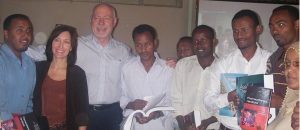Blog
Posted on March 3, 2010

Ethiopian pharmacy trainees show off the textbooks that UW pharmacy professors delivered on behalf of UW pharmacy students, who raised the funds to donate the books. Refer to article below.
University of Washington:
Teams bring sustainable solutions to address poverty to UW in annual international competition
University of Washington students compete in the sixth annual Global Social Entrepreneurship Competition (GSEC) to pitch business plans for commercially sustainable solutions that address issues of poverty in the developing world. Student teams from around the world will be in Seattle to compete and their plans will be judged on three criteria: effect on the quality of life and poverty alleviation in the developing economies; financial sustainability; and, feasibility of implementation.
Pharmacist’s role in patient care advanced in Ethiopia
UW pharmacy professor Andy Stergachis, and UW pharmacy students conducted five days of training for almost 40 pharmacy and health care representatives — including faculty members, students and deans from the four Ethiopian schools of pharmacy, government officials from Ethiopia’s equivalent of the Food and Drug Administration, and the president of the Ethiopian Pharmacy Association. They also donated more than $1,100 worth of textbooks to the Ethiopian pharmacy students, thanks to a fundraiser that UW pharmacy students had organized back at home. Stergachis is collaborating with colleagues from the UW and other institutions to implement various programs — from drug safety initiatives to medication-access programs — in multiple developing nations, including Ethiopia, Namibia, Rwanda and Vietnam.
Seattle University:
Seattle University’s “Hoops for Haiti” benefit raises $3,600 for relief efforts
Coach Cameron Dollar called on the Seattle University community to help Haiti and they responded in a big way at Saturday’s men’s basketball game. Fans at the “Hoops for Haiti” benefit game donated more than $3,600 to support the work of Catholic Relief Services (CRS) in Haiti.
Washington State University:
Director of the Center on U.S.-China Relations for the Asia Society to lecture at WSU Pullman
Famous lecturer concerning US-China, Schell, a Fellow at the East Asian Institute at Columbia University and the director of the Center on U.S.-China Relations for the Asia Society, will present a public lecture titled “Is China’s New Development Model More Competitive than Our Own?”
Other Global Education News:
Symposium: Global awareness an increasingly important skill
Educators need to rethink how they look at the global community, said Francesc Pedró during the ninth annual Consortium for School Networking (CoSN) International Symposium: Do they view other countries as competition, or as an opportunity for collaboration?
A Chance to Reinvigorate the Global Community Around Education
2010 has all the makings of being “The Year of Global Education.” Important events throughout the year include the G8 chairmanship by Canada, a country that historically has been a champion of global education; the FIFA partnership with the 1GOAL campaign, which endeavors to ensure that education for children in Africa and throughout the developing world will be the lasting legacy of this summer’s World Cup in South Africa; news that South African President Zuma will invite fellow heads of state to commit to coordinated action on education on the eve of the World Cup; the UN secretary-general’s Millennium Development Goals (MDGs). Review Summit () prior to the UN General Assembly in September, which will assess the reality of achieving education for all; and South Korea deciding that core development issues including education must be part of the newly-empowered G20’s top-line agenda for November.
Study shows global education is key to reducing apathy
DEA, a coalition which promotes global learning, brings together development and environment NGOs, as well as education NGOs, conducted a study that suggests people who learn about global issues feel more empowered to tackle them, rather than being overwhelmed by the extent of the problems. DEA’s Chief Executive, Hetan Shah said, “learning about the wider world leads to people who are more open-minded towards each other in the UK, but also encourages care for the rest of the world.” Their full report will be available online here.
Initiative for Global Development publishes new report on foreign aid reform
US-based business alliance Initiative for Global Development published a report that draws connections between the economic growth of developing country markets and the economic health of the U.S. The organization also observed how foreign-assisted programs on health, education and poverty eradication in developing countries helped uplift the quality of lives in the world’s poorer states, eventually creating markets for US’s export industry.
Posted on March 2, 2010
In Nicholas Kristof’s most recent column, “Learning from the Sin of Sodom,” he contends liberal secularists in the development community need to forsake their prejudice against evangelicals and understand the constructive role faith-based organizations play in foreign aid. By focusing on aid programs aimed at stemming the spread of infectious diseases, curbing human trafficking, and distributing food to the poor, Kristof argues that “evangelicals have become the new internationalists.”
To see a prime example of the positive impact evangelicals can have in development, one must look no further than Global Washington’s member organization World Vision. As the largest relief organization in the United States, World Vision fields 40,000 workers in almost 100 countries. Noting their Christian values as inspiration, World Vision works in the poorest communities to alleviate poverty and promote peace and justice regardless of race, religion, or gender.
The President of World Vision, Richard Stearns illustrates this sentiment of faith-driven aid in his book “The Hole in Our Gospel.” In the book, Mr. Stearns asserts that the values of Christianity are not inconsistent with giving aid, but some evangelicals have been too concerned with sexual morality and proselytizing to truly make an impact on poverty. Indeed, organizations such as World Vision forbid activities aimed at attracting converts to Christianity, exemplifying the constructive nature of some evangelicals’ aid work.
Ultimately, liberal secularists need to abandon their assault on faith-based development programs and accept the evangelicals’ valuable role in international development. That way, as Kristof argues, “we all might succeed together in making greater progress against common enemies of humanity.”
To learn more about the contributions of religion in development please visit the websites of World Vision and Global Washington’s other faith-based member organizations Habitat for Humanity of Seattle/South King County, Medical Teams International, Agros International, and Breakthrough Partners.
Posted on March 2, 2010

Apple details labor violations at its suppliers. Refer to article below. Photo courtesy of Apple Inc.
Foreign Aid:
Don’t miss the hearing on USAID and the FY2011 Budget Request this Wednesday, March 3rd, which will be webcast from the committee website.
The richest donor countries are not meeting the commitment made collectively at Gleneagles in 2005: to deliver $130 billion in aid by 2010. But aid has increased “remarkably,” according to Brookings, and the international commitment made 5 years ago to deliver more aid has helped.
See the OECD forecast of aid in 2010 – some countries will surpass their individual Gleneagles commitments in 2010, including Sweden, Denmark, Spain, and the UK. Among others, France and Germany will fall short. The United States made a less ambitious commitment to double aid to Africa, which it will reach in 2010.
Author Nicholas Kristof argues that “if secular liberals can give up some of their snootiness, and if evangelicals can retire some of their sanctimony, then we all might succeed together in making greater progress against common enemies of humanity, like illiteracy, human trafficking and maternal mortality.”
Congressman Sam Farr (Colombia 64-66) has released a bipartisan Dear Colleague letter urging a $465 million increase in appropriations for Peace Corps in fiscal year 2011. Ask your representative to sign on to a Dear Colleague letter in support of the Peace Corps.
Click here for a list of Representatives who have already signed up.
Labor Rights Violations:
The Washington Fair Trade Coalition reports: As earthquakes continue to devastate the people of Haiti, many people are learning for the first time how this country has been politically and economically exploited for centuries. The people of Haiti have come to recognize that working in sweatshop factories for Disney and the Gap is not the way to develop their country and education their children.
Apple Inc. outlined in a company report on audits of 102 supplier facilities conducted in 2009 said it found more than a dozen serious violations of labor laws or Apple’s own rules at its suppliers that needed immediate correction.
Click here for Apple’s 2010 Supplier Responsibility progress report.
Do you know of any products being made overseas with child labor or forced labor? Report it to the US Department of Labor by April 9th for inclusion in their report to Congress and the President. http://www.dol.gov/opa/media/press/ilab/ILAB20100134.htm
For statistics on labor and violations visit: http://www.ilo.org/global/lang–en/index.htm
Other Development News:
The Wall Street Journal labels their interviewees of prominent philanthropists and charity executives “philanthrocapitalists,” leaders in the worlds of business and finance, who are looking to apply the same zeal to donating money as to making it.
South African researchers claim treating tuberculosis and the AIDS virus simultaneously saves more than twice as many lives compared with attacking TB first. Dual treatment pays off with a 56 percent reduction in deaths from all causes, the large South African study published in the New England Journal of Medicine showed.
A Swedish entrepreneur is trying to market and sell a biodegradable plastic bag that acts as a single-use toilet for urban slums in the developing world. The entrepreneur successfully tested the bags in Kenya and India and says he plans to mass produce the bag this summer, selling them for two to three pennies each, comparable to the price of a plastic bag. According to UN figures, about 40 percent of the earth’s population does not have access to a toilet, which contributes to 1.5 million children worldwide who die yearly, largely because of poor sanitation and hygiene.
“The responsibility for the current difficulties in China- U.S. relations goes completely to the U.S. side”
http://www.businessweek.com/news/2010-03-02/china-says-u-s-entirely-to-blame-for-strained-ties-update1-.html
Does financial innovation boost economic growth? Ross Levine argues yes, and Joseph Stiglitz argues no. Read, vote, and contribute to the lively debate at the economist.com.
The Doha talks remain deadlocked and many countries blame the United States. The United States countered criticism by calling for better offers from advanced developing countries in service sectors such as finance, information and communication technology, distribution, and energy.

